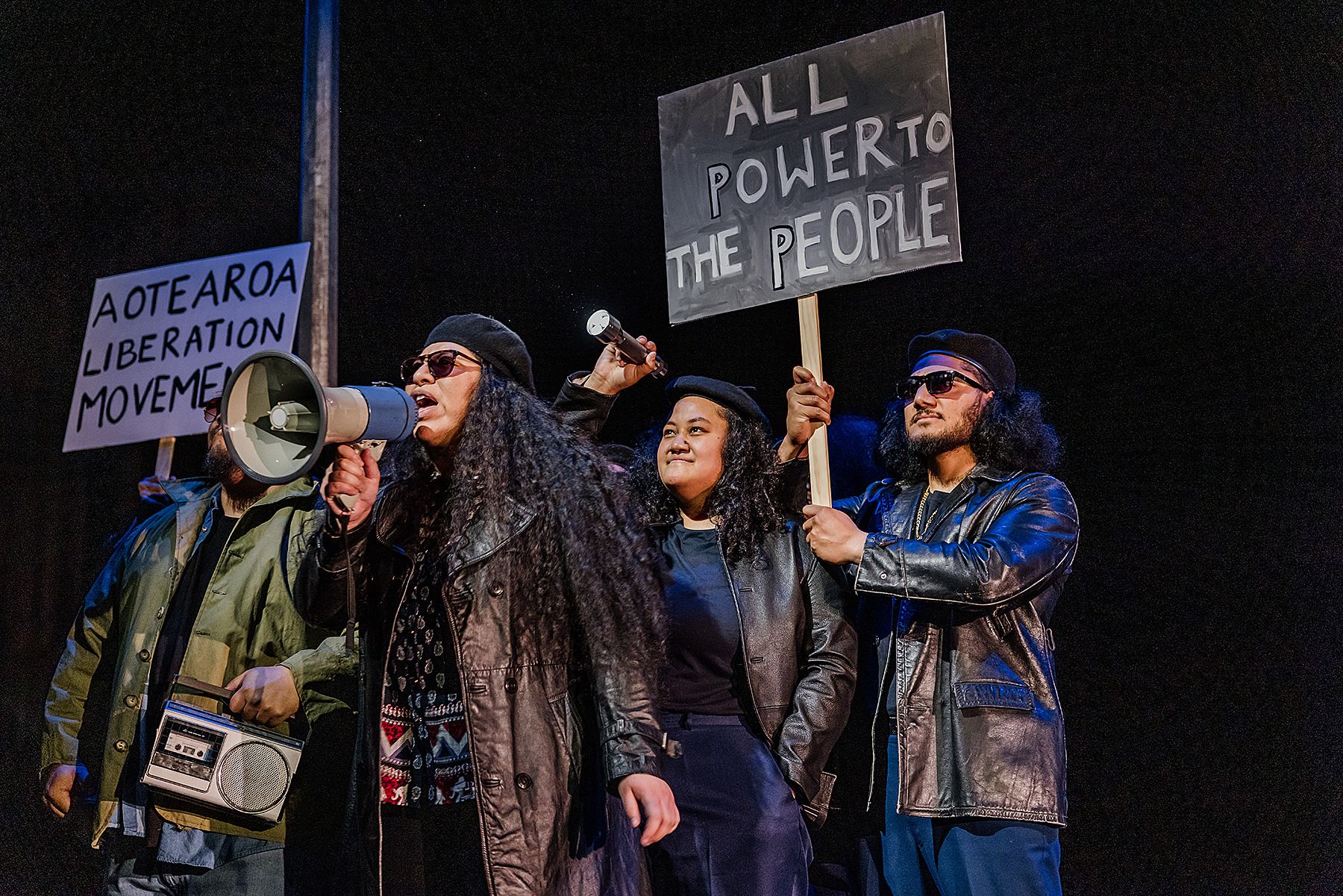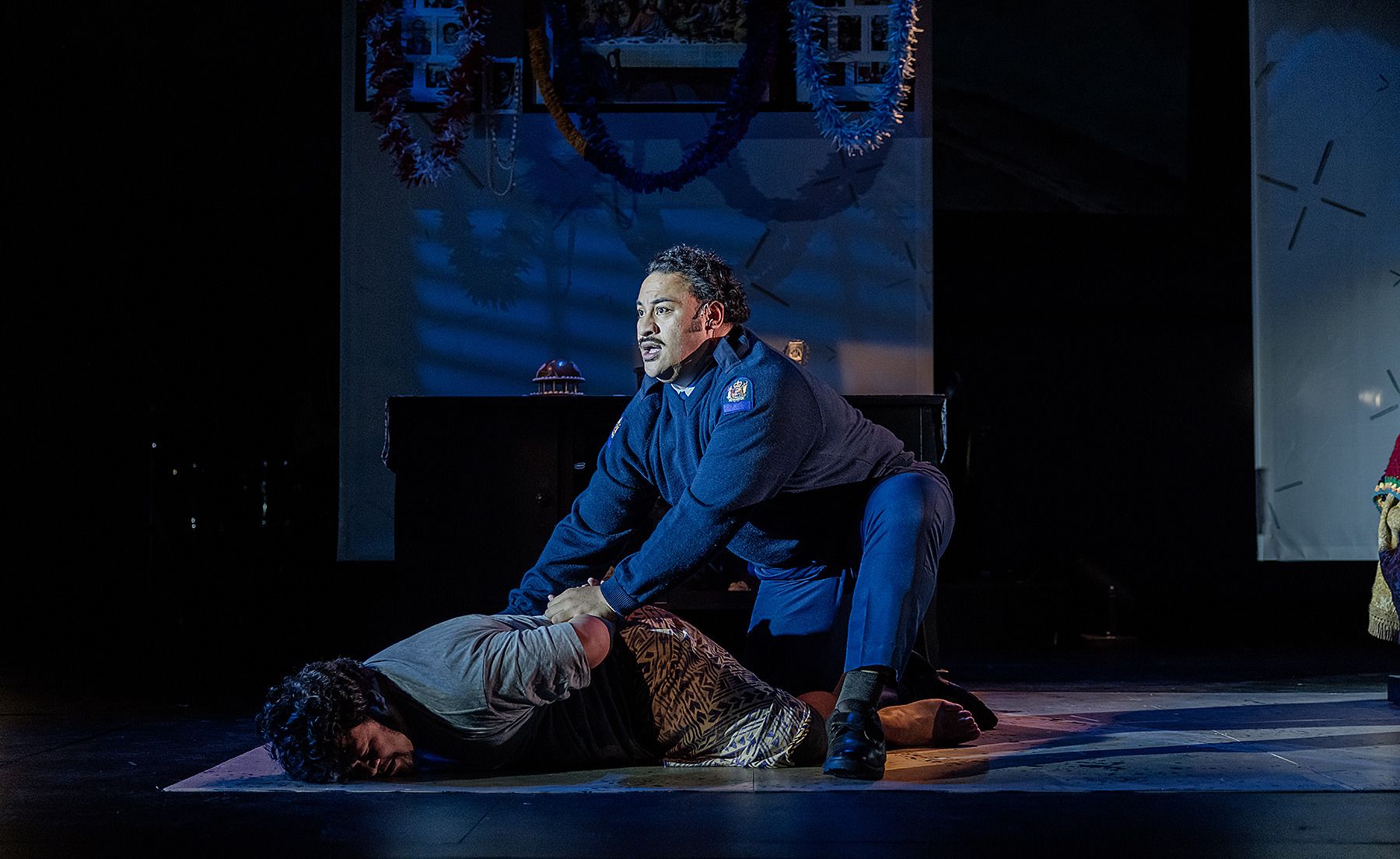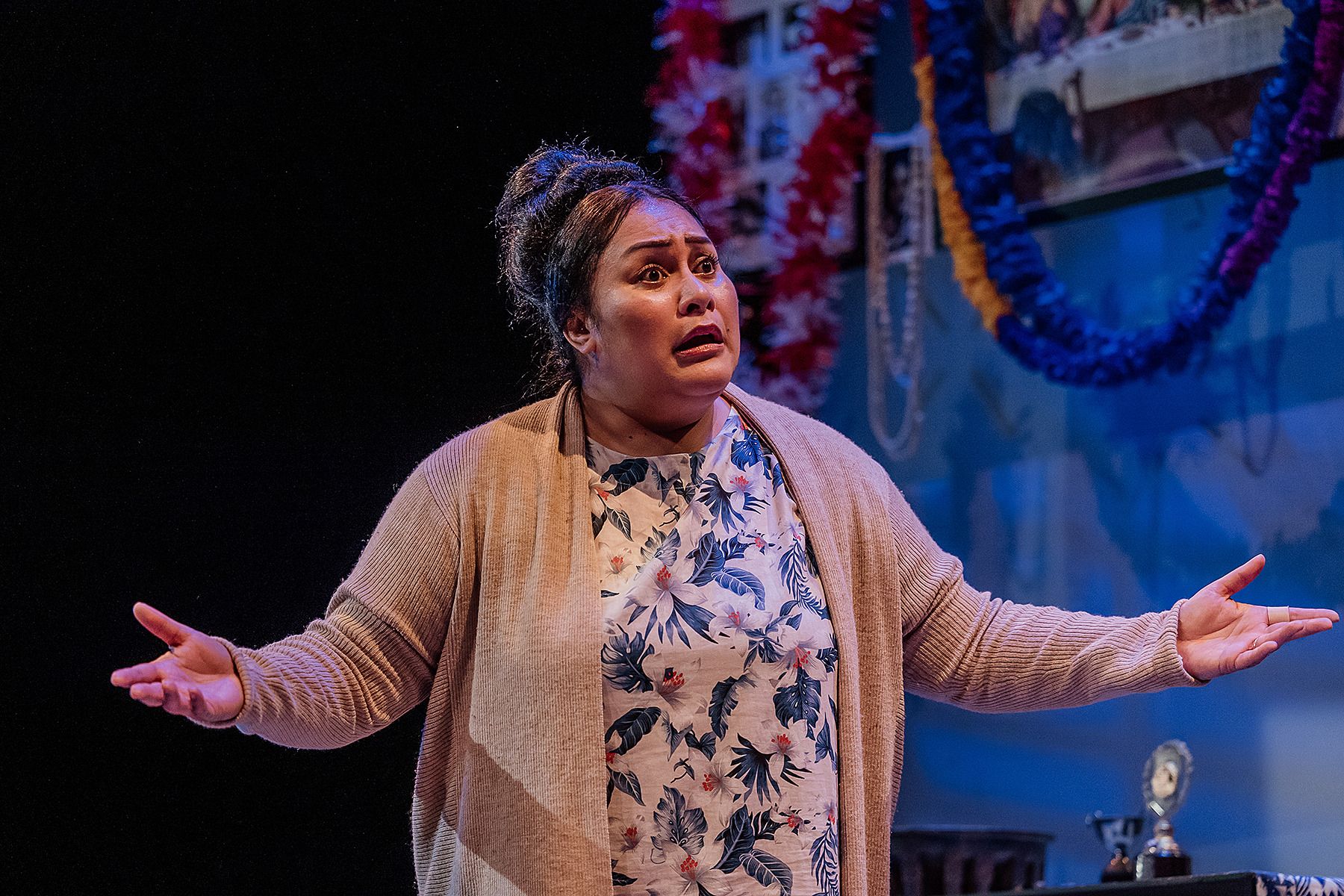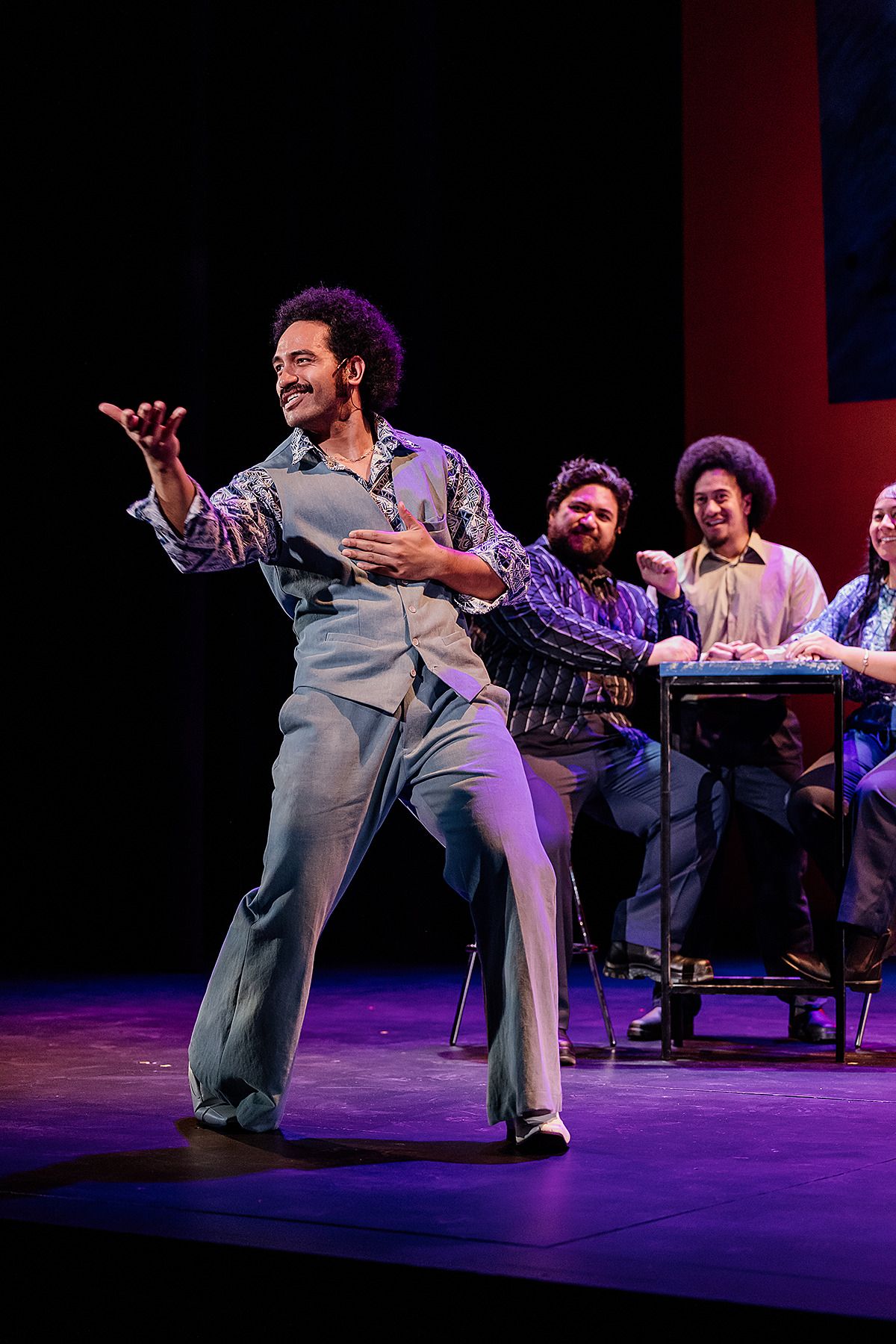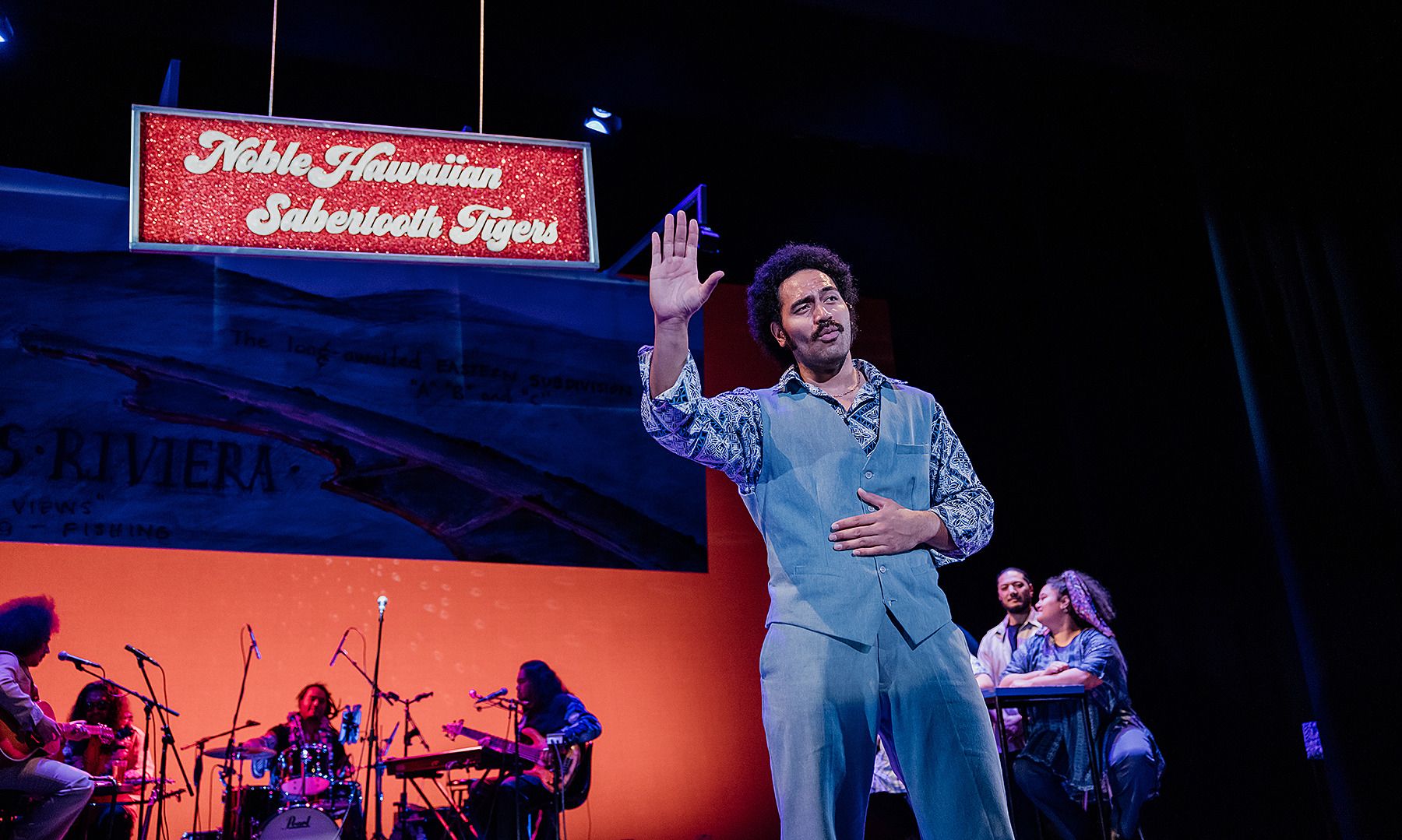A Promise to our Future: Faith Wilson responds to Dawn Raids
Faith Wilson responds to Dawn Raids, Oscar Kightley’s first play, restaged in 2022.
Dawn Raids was written by Sāmoan playwright Oscar Kightley in 1997. Oscar was a child during the heart of the Dawn Raids era, having recently been sent to Aotearoa from Sāmoa to live with relatives in Te Atatū. Years later, at the age of 25, Oscar wrote Dawn Raids to bring to light the stories of the Pacific peoples who experienced brutality at the hands of the New Zealand Government. In an interview with Taualofa Totua for Metro magazine, he says, “No one had done anything about it before – I just wanted to tell a story of that time.”
While the phrase ‘Dawn Raids’ was popularised in the 90s and 00s due largely to Dawn Raids Entertainment (Brotha D, Savage, etc.), I only learnt about the Dawn Raids in any real depth as an adult – and I know I’m not alone here. Schools weren’t really teaching it. My family certainly didn’t ever mention it.
For those that don’t know, the Dawn Raids were a period in this country’s history that began in the mid-1970s, when the New Zealand Government started ‘cracking down’ on Pacific Island immigrants whose visas had run out and who were deemed ‘overstayers’. Police would conduct aggressive raids on homes where Pacific Island immigrants were suspected of living, often conducted at dawn to surprise the families and catch the suspected overstayers sleeping. Those caught were often prosecuted and deported back to their home countries in the islands. Other people have written about this more extensively than I will here (and I suggest you do some reading about it), but the miscarriages of justice were such that, in 2021, the New Zealand Government apologised for the horrors and brutalities of the Dawn Raids.
Italia Hunt plays young Sāmoan cop, Steve. By Andi Crown Photography.
Back in 1997, Oscar was bringing some of the stories of the Dawn Raids to light for the very first time. In the foreword he wrote to his play, published by Playmarket in 2017, Oscar says “Growing up as a kid in the seventies, I only occasionally heard the term ‘dawn raids’. They weren’t really talked about … You just heard occasional hushed discussions.” Dawn Raids was Oscar’s first play, “drawn from many strands of real life”. He was telling a Pacific story, aided by Pacific Underground, with whom he collaborated to first stage the play.
Watching Dawn Raids for the first time in 2022, at the ASB Waterfront Theatre, I was, to be honest, expecting to be the lone brownie in a sea of posh Pākehā theatregoers. My perception of anything produced by the Auckland Theatre Company was that they attracted mainly rich Pālagi. How wrong was I, though? The theatre that night was packed to the rafters with the bodacious, beautiful sights and sounds of my Pasifika peeps – and it felt damn special.
The theatre that night was packed to the rafters with the bodacious, beautiful sights and sounds of my Pasifika peeps – and it felt damn special.
It felt special because after all the people who experienced the Dawn Raids went through, after the torrents of racism that followed Pacific and Māori people in Aotearoa, especially in inner-city Auckland, after the explicit racism, the internalised racism, the discrimination, and all that goes with it, our people are still here.
We’re still here, populating the seats of this bougie-as-hell theatre; we’re still here, as my favourite docuseriesStill Here illustrates – in the hubs of Ponsonby, Grey Lynn, Freemans Bay, Kingsland; we’re still here, making art, making music and putting on plays to sell-out audiences.
Seeing this story come to life feels like a promise. A promise to our future. That in light of the Government’s apology last year, we remember that we can forgive, but these stories should never be forgotten. We’ll keep revisiting these stories, as our people continue to thrive, because they’re part of our gafa in Aotearoa. I feel so privileged to have seen this play and to witness our stories being told on stage.
**
Dawn Raids follows the lives of a family who live in Auckland in the 1970s. The play orbits several main characters in one family, including benevolent matriarch To‘aga; beer-loving, constitution-loving patriarch Mose; their Polynesian Panther-esque daughter Teresa, who is hell-bent on fighting the power; their son Sione, who has dreams of becoming famous and making it rich as his musical alter-ego Fabian; and Sione’s fiancée, idealistic, dreamy Fuarosa, an overstayer whom the family is hiding. Intergenerational differences are a cause for tension within the family, as Sione and Teresa push back against the traditional beliefs of their father, who is unhappy about the fact they are hiding Fuarosa.
Then there are a few other juicy key players whose lives we follow, including a young Sāmoan cop named Steve who faces a moral dilemma as the drama unfolds, torn between his culture and his work duties.
Bella Kalolo-Suraj plays To'aga. By Andi Crown Photography.
Everyone knows that in heteronormative Sāmoan families like the one in Dawn Raids, it’s the mothers who run the household, despite the oft-domineering fathers who like to think they do. Matriarch To‘aga is played by Bella Kalolo-Suraj, who gives a tender, understated performance that captures the subtleties of a Sāmoan mother so well. The emotional and physical labour that To‘aga carries as the family matriarch is captured in the loaded, heavy sighs, shakes of the head, and disapproving side-eyes. Never a shrinking violet, though, To’aga is not afraid to speak up when she disagrees with her husband, showing us all the more why we stan our Moana Mamas. The intergenerational tensions of these stereotypically gendered roles are counterpointed through her daughter, the staunch and unapologetic character Teresa, played by Talia-Rae Mavaega.
Talia-Rae Mavaega plays Teresa. By Andi Crown Photography.
I love Talia-Rae as Teresa – I see so much of myself in her. I’m reminded of a line in Coco Solid’s How to Loiter in a Turf War, where she describes a character as “exud[ing] the freedom of children who can yell at their parents.” That’s Teresa and, embarrassingly, me. Talia-Rae totally captures that second generation rattling against the outdated ways of yesteryear in a way that is crack-up and very recognisable. Lippy, always, and sometimes naive, Teresa is a force to be reckoned with, standing up to cops, giving legal advice to her co-conspirators about the Dawn Raids, and protesting against police brutality. She’s an idealist, a warrior… and most definitely an Aries.
Michael Falesiu plays Sione/Fabian. By Andi Crown Photography.
Michael Falesiu shines as the family’s son, Sione/Fabian. Oozing charisma. You can’t help but smile every time he comes on stage as Fabian, charming the audience and thrusting his hips. In real life, if someone was trying to woo me with a hip-thrust I’d be more than a little put off, but it didn’t seem sleazy when Fabian did it. It’s that gd Poly-boy charm. Michael shows range as he switches between being the dreamer who aspires to become a world-famous performer, and the frustrated and overworked mechanic, engaged to an overstayer partner-in-hiding who he can’t even take outside for a date.
Outside of the family is the young Sāmoan cop, Steve, whose internal struggle sees him try to be a ‘good cop’ while also facing pressure from his superiors to partake in the raids. Italia Hunt plays this complex and confused character with empathy and depth. It’s easy to pass judgement and be a bit moralistic when faced with a character like Steve. Italia’s soft and somewhat gauche Steve shows us just how easy it is for someone with good intentions to get caught up working for the system.
Steve shows us just how easy it is for someone with good intentions to get caught up working for the system.
One of my favourite scenes involving Steve is a beautiful dream sequence, where the young cop has an imagined conversation with his dad in Sāmoa. A translucent white screen appears centre-stage, behind which a young woman performs a siva. The slow grace of her movements and the diaphanous sheet make her look like an angel. Steve’s father appears behind the screen and they converse in Sāmoan. Torn between doing a good job and being an ally to his people, he imagines what his father would say to him. I felt moved by this scene. It is visually and aurally arresting, and we get to see Steve as a human, morally challenged, and pulled in two different directions.
The rest of the cast all deserve a big shout-out. Lauie Tofa plays the belligerent and tunnel-visioned family patriarch Mose convincingly. I enjoyed Gabrielle Solomona’s quietly cheeky and dreamy Fuarosa. Jake Tupu plays Teresa’s sidekick Bene to much comic (and tragic) effect. Another huge shout-out goes to the musicians.
The Noble Hawaiian Sabretooth Tigers. By Andi Crown Photography.
The music is gd brilliant and makes the play a fully immersive experience. The onstage band are a key presence in the play from the moment you step into the foyer. They not only provide (the best, ever) background music, but are also incorporated into the play itself as Sione aka Fabian’s backup band, at which point they transform into the Noble Hawaiian Sabretooth Tigers.
Directed by Posenai Mavaega, the band jam those bops that place you firmly in Aukilani’s music clubs of the 1970s, playing hits from The Doobie Brothers, Earth Wind and Fire, and all those other hits you know the lyrics to and sing hoarsely with a bottle of Waikato in hand at 4am in your uncle’s garage. Sione/Fabian croons just like a South Pacific Elvis, his voice perfectly complementing the musicians’ deft playing.
The music, the script and the acting work together in a beautiful tandem. The alluring and cheesy lilt of the steel guitar takes on an eeriness when used as the background to more dramatic scenes. The banging of the cymbal in perfect sync with a cop bashing the character Bene with a baton rang in my head for many hours after the play was over. The Doors-like desert psychedelic tunes that play as the cops arrest and brutalise a swathe of Pacific immigrants feel strange and awkward.
This use of music really lifts the drama following a high-intensity scene where the police raid a bar looking for overstayers. It’s an uncomfortable moment, scary, but immediately followed by a scene at the nightclub with the Noble Hawaiian Sabretooth Tigers, all lights and glitter and campy shine. Sione/Fabian sings with his smooth, coconut-cream voice: “When the moooon, hits your eye, like a big pizza pie, that’s amoreeee!” The audience cracks up, and the comic relief is a much-needed antidote to the previous scene’s tension.
The balance between comedy and tragedy is something Oscar is deft at, and the production team strikes that balance bang on. Oscar is probably best known to New Zealanders as a comedian, and rightly so, he’s hilarious. But for those looking for a few cheap Islander jokes, Dawn Raids isn’t your play. The jokes in this play are in service of a story that is deeper, and darker. That darkness is ever present. In the weary sighs of To‘aga; behind Sione’s cheesy grin and his fake Hawaiian persona Fabian; in Mose’s belligerent anger; in Fuarosa’s frightened, captive daily life.
for those looking for a few cheap Islander jokes, Dawn Raids isn’t your play
This balance of comic–tragic, light–dark is executed perfectly at the end. The band strikes up one last time, and Sione, who has eschewed his fake Hawaiian persona Fabian and is now proudly claiming his Sāmoan identity, is treating the audience to a final number. Like most productions, the remaining cast members walk on stage to gather together for one last round of applause. Rather than break character, though, they each return to the stage still totally immersed in their grief, following the final tragic events of the play. The over-the-top happiness of Sione’s singing and the overtly joyful music of the band are at odds with the pain-stricken expressions on the faces of the rest of the cast. The emotional complexity of the play is captured in this final moment, the pain of our stories betraying the happy Islander cliché we are often painted with.
**
For an artist, the decision to revisit something written 25 years ago is a bold choice, particularly if it’s the first play you ever wrote. To me, it shows humility, and that Sāmoan virtue tautua, to be of service. If a play is for the people, then let it serve the people in the way they need it to. Bringing it to new audiences, teaching my generation, and the generations that come after me, is proof that this play is truly serving.
So what does it mean to retell a story in the 2020s that was written in the 1990s, about events that happened in the 1970s? If the purpose of the play in the 1990s was to shed light on stories that had been repressed and suppressed, then perhaps the purpose of restaging that play in 2022 is to keep those stories from ever being forgotten.
So what does it mean to retell a story in the 2020s that was written in the 1990s, about events that happened in the 1970s?
Seeing the theatre packed full of Brown faces – loud, cheehooing, frickin EXTRA Brown faces – is a celebration. Seeing Dawn Raids in 2022 feels like an opportunity to connect with the past, to celebrate our successes and our pain, together. To share our stories, and to reflect, but to put our money on the future. When I think about the multitude of issues that my people face, (including falling literacy rates), I look to writers like Oscar, to stories like the Dawn Raids, to the amazing Pasifika team behind this production. I think about the tamaiti who will maybe see this play. Who might read it. Whose family might read it, and talk to them about it. Rather than despair, I see hope. And if putting this play on to a packed audience in 2022 shows us anything, it’s that we should never let go of that.
Dawn Raids
by Oscar Kightley
Auckland Theatre Company and Pacific Underground
16 August – 3 September 2022
Header image by Andi Crown Photography
